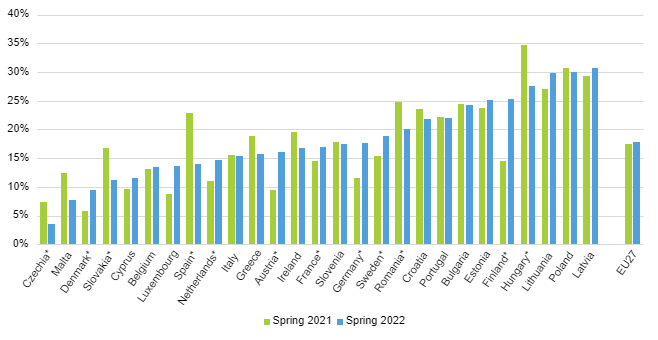Lower levels of health, increasing financial pressure and a significant degree of unmet healthcare are among the main findings in a survey published last week by Eurofound, the Dublin-based EU Agency for the improvement of living and working conditions.
Eurofound’s work on COVID-19 examines the socioeconomic implications of the pandemic across Europe as they continue to impact living and working conditions. A key element of the research is an e-survey, launched in April 2020, with five rounds completed at different stages during 2020, 2021 and 2022.
The latest report, ‘Living in a new era of uncertainty’, presents an overview of responses from over 200,000 people across all five rounds of the e-survey.
The number of people reporting ‘bad’ or ‘very bad’ health more than doubled between 2020 and 2022. Despite the lifting of most lockdown measures in early 2022 as the pandemic subsided, the number of people reporting ‘bad’ or ‘very bad’ health continued to increase, from 7.9% in March 2021 to 12.7% in March 2022.
There is also a higher risk of depression among people who report their health as being ‘bad’ or ‘very bad’, according to the report. A respondent scoring below 50 is considered to be at risk of depression. In March 2022, the average level of mental well-being in the EU was 47 – a slight improvement on the level recorded in 2021 (45), but still below the level measured at the start of the pandemic (49).
Eurofound explains that a high degree of concern about the rising cost of living in the EU mixed with uncertainty about the future could continue to have a negative impact on mental health. Figures in the report show a correlation between respondents’ reported ability to make ends meet and mental well-being.
Another impact of the pandemic are unmet healthcare needs. They have increased across the EU and are affecting almost one in five respondents (18%) in the survey. The backlog in care is highest for hospital and specialist care, mental healthcare and dental care.
Unmet healthcare needs by country, EU27 (%), source: E-survey, Eurofound
While the issue of unmet healthcare needs among younger people has decreased somewhat (62% in 2021, 49% in 2022), there are worrying signs that younger women are more at risk, with almost 1 in 4 reporting unmet needs (up from 1 in 5 in 2021).
With the re-opening of society, many had hoped that mental well-being would improve. However, in spring 2022, when the survey was conducted, the risk of depression remained worryingly high for many people.
On the work front, it was widely predicted that teleworking was here to stay, and that the pandemic would trigger a work-from-home revolution that would change the future of work permanently. However, by spring 2022 many e-survey respondents were working exclusively at their workplace again.
Yet the preference of respondents seems to have been to continue to telework – daily or several times a week – and the proportion expressing this preference is highest among those aged 30–44 years who typically have young children.
Furthermore, during the pandemic, trust across public institutions was steadily fallen among the respondents. Factors such as the war in Ukraine and the rise in inflation and energy appear to be exacerbating this trend. In some countries (Finland, Denmark, Sweden, Austria and the Netherlands), respondents are reporting the lowest levels of trust in spring 2022 compared to spring 2020.
In general, vaccine-hesitant respondents have much lower trust in institutions than those who are vaccinated, and this gap has widened since 2021. Vaccine hesitancy is much higher among respondents who have low trust in institutions, who mainly get their news from social media or who do not follow the news at all.
Paradoxically, vaccine-hesitant people appear to be an emerging group of citizens who are politically engaged and participate in demonstrations or express their political views on social media.
The findings show that when social media is the preferred news source, trust plummets, with the biggest difference in trust apparent in news media and trust in government. As the war in Ukraine rages on, combating the spread of misinformation to avoid undermining the stability of governments and the EU will be one of Europe’s biggest challenges.
The Brussels Times


